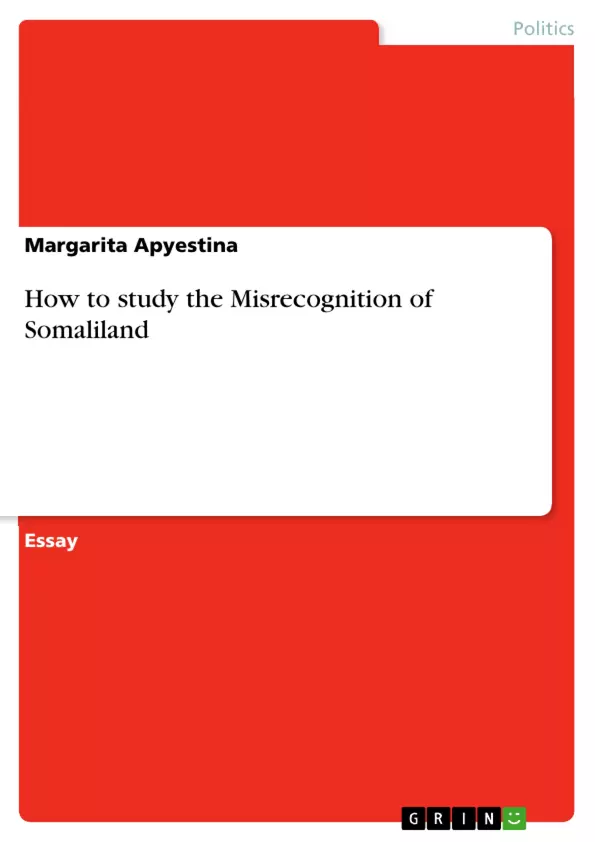This brief discussion suggest how the misrecognition of the defacto state Somaliland can be studied although its status as an inofficial region poses many difficulties and obstacles to draw a conclusion on further political and geostrategic developments.
Inhaltsverzeichnis (Table of Contents)
- How to study the Misrecognition of Somaliland
- Misrecognition of Somaliland
- How misrecognition of Somaliland can be studied
- Somaliland's Constitution
- Modern Democracies and Somaliland's Constitution
- Studying a Country's Constitution
- Interests of the International Community
- Newspaper articles
- Interests of the International Community
Zielsetzung und Themenschwerpunkte (Objectives and Key Themes)
This essay examines the complex issue of Somaliland's misrecognition by the international community. The author explores the reasons behind this lack of recognition, analyzing Somaliland's self-perception and its constitutional framework. The paper also investigates the role of international interests and potential future developments related to Somaliland's recognition.- The misrecognition of Somaliland by the international community
- Somaliland's self-perception and its political identity
- The constitutional framework of Somaliland and its alignment with democratic principles
- The role of international interests in the recognition of Somaliland
- Potential future developments regarding Somaliland's recognition
Zusammenfassung der Kapitel (Chapter Summaries)
- The essay begins by defining misrecognition in the context of quasi-states and their parent states. The author highlights the two main reasons for misrecognition: internal deficiencies and the parent state's refusal to recognize the secessionist region.
- The essay explores Somaliland's claim to statehood, highlighting its independence declaration and the fulfillment of the three key elements of statehood defined by Jellinek: territoriality, sovereignty, and nation.
- The author analyzes Somaliland's constitution, focusing on its self-portrayal as a democratic republic. The essay examines the constitutional provisions related to sovereignty, freedom of religion, and the role of Sharia law.
- The essay discusses the potential limitations of Somaliland's constitution in terms of democratic principles, particularly regarding freedom of religion and thought, and the restriction on the number of political parties.
- The essay argues that while Somaliland's constitution reflects a commitment to democratic principles and human rights, the international community's interests play a significant role in the lack of recognition.
- The essay explores various international interests, including concerns about the Somali terrorist group al-Shabab, the potential for secessionist movements in other African regions, and economic interests in Somaliland.
- The author examines newspaper articles that provide insights into current and future trends concerning Somaliland's recognition. The essay analyzes the potential benefits of recognition for Kenya and Ethiopia, as well as the potential for British recognition.
Schlüsselwörter (Keywords)
This essay focuses on the misrecognition of Somaliland, exploring its self-perception as a democratic state, analyzing its constitutional framework, and examining the influence of international interests on its potential for recognition. Key themes include quasi-states, secession, international recognition, statehood, democracy, human rights, Sharia law, Somaliland's constitution, international interests, and potential future developments.Frequently Asked Questions
Why is Somaliland considered a "de facto" state?
Somaliland fulfills the criteria of statehood defined by Jellinek (territory, sovereignty, and nation) and has declared independence, yet it remains unrecognized by the international community, making it a de facto but not de jure state.
What are the main reasons for the misrecognition of Somaliland?
The two primary reasons are the refusal of the parent state (Somalia) to recognize the secession and the international community's geostrategic interests and concerns regarding regional stability.
Is Somaliland's constitution democratic?
Somaliland's constitution portrays the country as a democratic republic. However, there are limitations regarding religious freedom (due to Sharia law) and restrictions on the number of allowed political parties.
What role does Sharia law play in Somaliland?
Somaliland's constitutional framework incorporates Sharia law, which can create tensions with international democratic principles, particularly regarding freedom of thought and religion.
Which international interests prevent Somaliland's recognition?
Interests include fears of encouraging other secessionist movements in Africa, concerns over the terrorist group al-Shabab, and complex economic ties with neighboring countries like Ethiopia and Kenya.
- Citar trabajo
- Margarita Apyestina (Autor), 2011, How to study the Misrecognition of Somaliland, Múnich, GRIN Verlag, https://www.grin.com/document/262754



